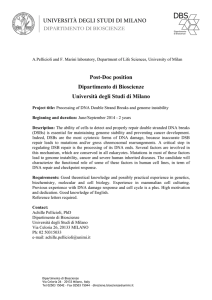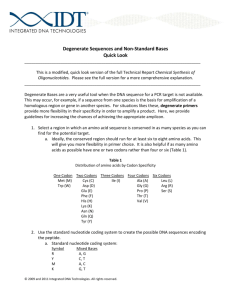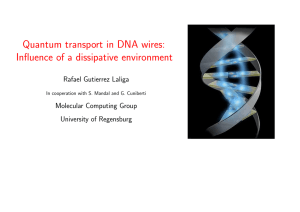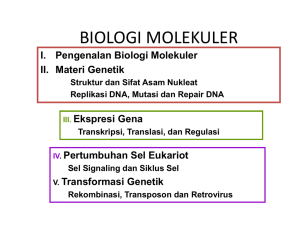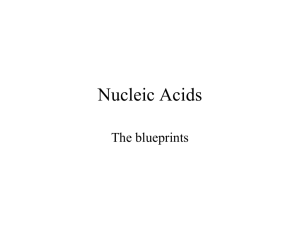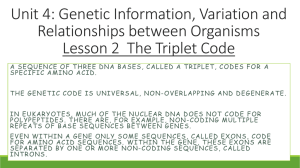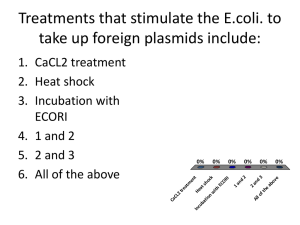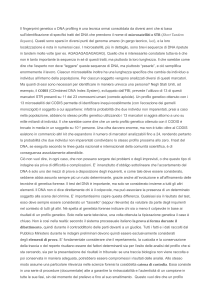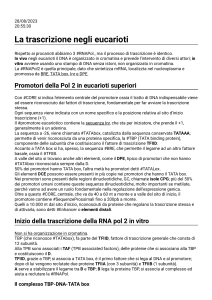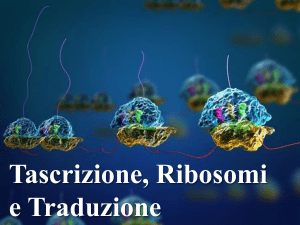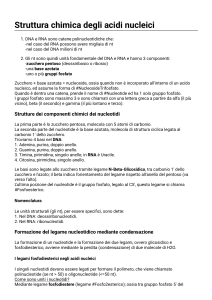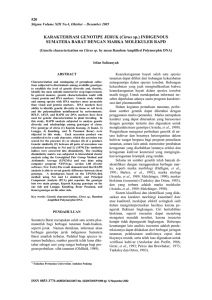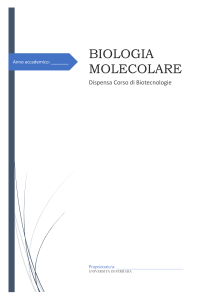Nessun titolo diapositiva
advertisement
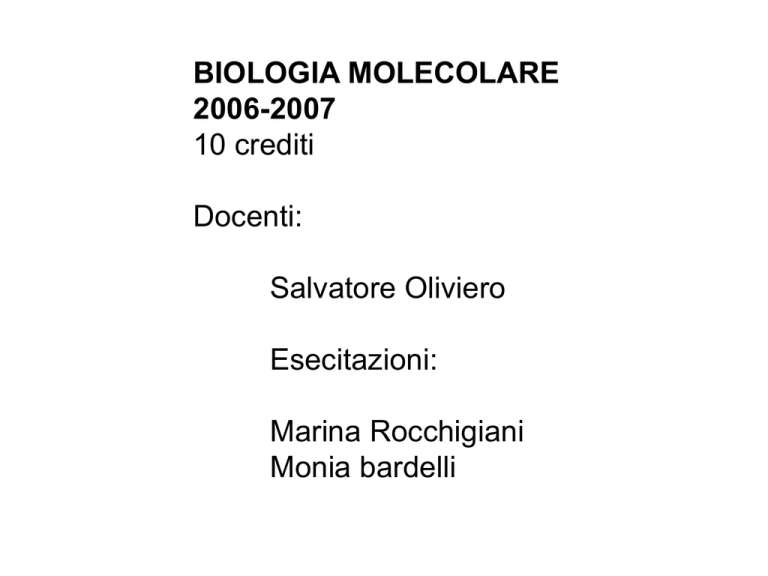
BIOLOGIA MOLECOLARE 2006-2007 10 crediti Docenti: Salvatore Oliviero Esecitazioni: Marina Rocchigiani Monia bardelli L’esame consiste in un compito scritto con domande simili a quelle utilizzate nelle esercitazioni del corso Date delle prove d’esame: • mercoledi’ 21 febbraio ore 9 aula 8 • giugno 4 settimana • luglio 2-3 settimana • settembre 3-4 settimana Testi consigliati: • file di ppt al sito http://www.unisi.it/oliviero_lab/ >teaching > Biologia Molecolare (Coordinatore Prof. Oliviero) • Genes VIII - B. Lewin (ed. Oxford University press.) • DNA ricombinante - Watson , Gilman, Witrowski , Zoller ( Ed. italiana Zanichelli) (introduzione alla BM) •Dai Geni ai genomi - Dale, von Schantz (Ed.italiana EdiSES) (metodi della Biologia Molecolare) • Biologia Molecolare della cellula - H.Lodish e altri (ed. italiana Zanichelli) • Il fago lamda - M.Ptashne (disponibile in biblioteca di biologia) 1953 (April) James Watson and Francis Crick discover the double helical structure of DNA (Nature). Hypothetical model Published in 1953 The Nobel Prize in Physiology or Medicine 1962 "for their discoveries concerning the molecular structure of nucleic acids and its significance for information transfer in living material" Francis Harry Compton Crick James Dewey Watson Maurice Hugh Frederick Wilkins Institute of Molecular Biology Cambridge, United Kingdom b. 1916 Harvard University Cambridge, MA, USA b. 1928 University of London London, United Kingdom b. 1916 1/3 of the prize United Kingdom 1/3 of the prize USA 1/3 of the prize United Kingdom The difference between DNA and RNA is that DNA has a deoxyribose sugar, with an H atom connected to the 2’ position, whereas RNA has a ribose sugar with an -OH group connected to the 2’ position. DNA contains the four bases adenine, guanine, cytidine, and thymine; RNA has uracil instead of thymine. A nucleoside consists of a purine or pyrimidine base linked to position 1 of a pentose sugar. A nucleotide consists of a nucleoside linked to a phosphate group on either the 5’ or 3’ position of the (deoxy)ribose. Positions on the ribose ring are described with a prime (’) to distinguish them. A nucleoside consists of a purine or pyrimidine base linked to position 1 of a pentose sugar. A nucleotide consists of a nucleoside linked to a phosphate group on either the 5’ or 3’ position of the (deoxy)ribose. Positions on the ribose ring are described with a prime (’) to distinguish them. Successive (deoxy)ribose residues of a polynucleotide chain are joined by a phosphate group between the 3’ position of one sugar and the 5 position of the next sugar. DNA DOPPIA ELICA ~10 bp DNA-RNA RNA-RNA ~11bp ELICA SINISTRORSA Antiparallel strands of the double helix are organized in opposite orientation, so that the 5’ end of one strand is aligned with the 3’ end of the other strand. The B-form of DNA is a double helix consisting of two polynucleotide chains that run antiparallel. The nitrogenous bases of each chain are flat purine or pyrimidine rings that face inwards and pair with one another by hydrogen bonding to form A-T or G-C pairs only. The diameter of the double helix is 20 Å, and there is a complete turn every 34 Å, with 10 base pairs per turn. In B form each single stranded DNA is wound one around The other at about ~10 bases per turn. DNA with less than 10 bases per turn is supercoiled negatively DNA with more than that 10 bases per turn is supercoiled positively The linking number represents the degree of supercoiling DNA molecules that differ only by the linking number are topologcal isomeres DL= DW + DT L = linking number W = writhing number (axis turn in space for a relaxed molecule W = 0) T = twisting number total numbers of turn of one strand over the other for circular flat DNA is total n.bases/n.bases per turn Circular DNA or DNA fixed on the extremities the linking number cannot change Topoisomerase I introduces a transient break in one DNA strand ATP independent Topoisomerase II double strand breack In E. coli there are two type I (topoisomerase I and III) topoisomerases And two type II topoisomerase (girase and topoisomerase IV) During trasnscription girase introduce negative supercoils (or relieves the positive ahead of RNA polymerase) while topoisomerase I and IV remove the negative supercoil after the RNA polymerase Denaturation of DNA or RNA describes its conversion from the double-stranded to the single-stranded state; separation of the strands is most often accomplished by heating. Renaturation is the reassociation of denatured complementary single strands of a DNA double helix. Hybridization is the pairing of complementary DNA •with DNA from other sources •RNA and DNA strands to give an RNA-DNA hybrid. Melting of DNA means its denaturation. Melting temperature of DNA is the mid-point of the transition when duplex DNA to denatured by heating to separate into single strands. Heating causes the two strands of a DNA duplex to separate. The Tm is the midpoint of the temperature range for denaturation. Complementary single strands can renature when the temperature is reduced. Denaturation and renaturation/hybridization can occur with DNA-DNA, DNA-RNA, or RNA-RNA combinations, and can be intermolecular or intramolecular. The ability of two single-stranded nucleic acid preparations to hybridize is a measure of their complementarity. In laboratorio si calcola in maniera emipirica la temperatura di denaturazione considerando che sia di 4 0C per ciascuna coppia G-C e 2 0C per ciascuna coppia A-T si applica solo a squenze brevi (10-20 nucleotidi)
